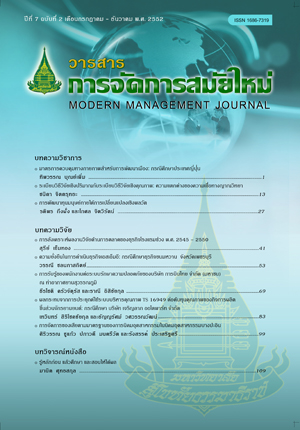ความยั่งยืนในการดำเนินธุรกิจเอสเอ็มอี : กรณีศึกษาธุรกิจขนมหวาน จังหวัดเพชรบุรี
Keywords:
ธุรกิจเอสเอ็มอี, ความยั่งยืน, จังหวัดเพชรบุรี, Business, SMEs, Sustainability, PhetchaburiAbstract
บทคัดย่อ
การวิจัยครั้งนี้ มีวัตถุประสงค์ เพื่อศึกษาปัจจัยส่งเสริมความสำเร็จอย่างยั่งยืนในการดำเนินธุรกิจขนมหวาน ในจังหวัดเพชรบุรี รูปแบบการวิจัย เป็นการวิจัยเชิงคุณภาพที่ใช้วิธีการสัมภาษณ์แบบเชิงลึกกับกลุ่มตัวอย่างซึ่งเป็นผู้ให้ข้อมูล สำคัญ จำนวน 5 ราย ที่เป็นเจ้าของประกอบการธุรกิจขนมหวานในจังหวัดเพชรบุรี โดยทำการเลือกตัวอย่างแบบเจาะจงจากผู้ที่ ดำเนินธุรกิจมานานกว่า 10 ปี และเต็มใจให้ข้อมูล เครื่องมือที่ใช้ในการวิจัย ได้แก่ แนวสัมภาษณ์เชิงลึก เครื่องบึนทึกเสียง และ สมุดบันทึก การวิเคราะห์ข้อมูลเป็นการวิเคราะห์เนื้อหาจากบันทึกการสัมภาษณ์และการถอดเทปเสียง
ผลการวิจัย พบว่า ปัจจัยที่ส่งเสริมความสำเร็จอย่างยั่งยืนในการดำเนินธุรกิจขนมหวานในจังหวัดเพชรบุรี คือ การจัดการที่มีประสิทธิภาพในหน้าที่หลัก 6 ด้าน ได้แก่ 1) การจัดการการผลิต ร้านขนมหวานทุกร้านให้ความสำคัญกับ คุณภาพขนมเป็นลำดับแรก ขนมหม้อแกงเป็นผลิตภัณฑ์หลักที่เน้นการผลิตโดย ใช้วัตถุดิบที่มีคุณภาพสูงมาจากแหล่ง เฉพาะ ไข่เป็ดต้องเป็นไข่ที่ใหม่และสด เผือกต้องใช้หัวใหญ่ไม่มีตำหนิ มะพร้าวมาจากอำเภอทับสะแก และน้ำตาลโตนด จากจังหวัดเพชรบุรี สูตรการทำขนมถูกถ่ายทอดมาจากบรรพบุรุษผู้บุกเบิกธุรกิจรุ่นแรกโดยต่างคนต่างคิดค้นลองผิดลองถูก มาเองและเป็นสูตรของตนเองในแต่ละร้าน คุณภาพของวัตถุดิบที่สูงและการผลิตผ่านกระบวนการที่เน้นความสะอาดช่วย ให้ขนมมีอายุยาวขึ้นโดยไม่ต้องใส่สารกันบูด 2) การจัดการการตลาด ทุกร้านขายขนมมากหลายสิบชนิด แต่ขนมหม้อแกงจะ เป็นภาพลักษณ์ของร้านขายขนมหวานที่ใช้ชื่อของผู้ก่อตั้งธุรกิจที่ขึ้นต้นว่า “แม่” เป็นส่วนใหญ่ และภาพของบุคคลดังกล่าว คือ โลโก้ที่ถูกจดจำเป็นแบรนด์ของสินค้า ขนมหม้อแกงให้กำไรน้อยแต่เป็นผลิตภัณฑ์หลักที่จูงใจให้ลูกค้าเข้าร้านและซื้อ สินค้าอื่นที่ให้กำไรสูง ทุกร้านไม่ส่งเสริมการขายโดยการโฆษณา นิยมให้ของแถมเป็นขนมอื่นที่มิใช่ขนมหม้อแกงเมื่อซื้อ สินค้ามูลค่าสูง 3) การจัดการการเงินและการบัญชี ทุกร้านจะมีโครงสร้างเงินทุนที่ปลอดหนี้ มีเครดิต การจัดการเงินทุน หมุนเวียนนั้น ทุกร้านสามารถจัดการกับระยะเวลาการได้สินเชื่อเท่ากันหรือสั้นกว่าระยะเวลาการปล่อยสินเชื่อ การทำบัญชี จะใช้บริการจากภายนอก เสียภาษีในระบบเหมาจ่าย พอใจกับผลตอบแทนและการได้จับเงินทุกวัน เพราะการขายหน้าร้าน เป็นเงินสด 4) การจัดการทรัพยากรมนุษย์ ทุกร้านจะใช้คนในพื้นที่ ลูกจ้างที่อยู่มานานจะได้รับความไว้วางใจสอนงาน จนสามารถทำแทนเจ้าของได้ อยู่ร่วมกันมีลักษณะเหมือนญาติ 5) การวิจัยและพัฒนา ตัวผลิตภัณฑ์จะถูกพัฒนาไปบ้างตาม กระแสสังคมเช่นเดียวกับบรรจุภัณฑ์แต่ไม่รวดเร็วมาก 6) คุณธรรมจริยธรรม ผู้ประกอบการร้านขนมหวานทุกร้าน เป็นผู้ที่มี คุณธรรมจริยธรรมสูง ยึดหลักความซื่อสัตย์ต่อลูกค้าซึ่งถูกถ่ายทอดและถือปฏิบัติอย่างหนักแน่นตลอดมา เช่นเดียวกับ การให้บริการแก่สังคมและการไม่เอาเปรียบลูกจ้าง ไม่ปลดหรือไม่ให้ออกแม้กิจการจะได้รับผลกระทบจากภาวะเศรษฐกิจตกต่ำ
คำสำคัญ : ธุรกิจเอสเอ็มอี, ความยั่งยืน, จังหวัดเพชรบุรี
ABSTRACT
The purpose of this research was to study factors enhancing sustainable success of dessert business operation in Phetchaburi province. This study employed the qualitative research methodology. Research data were collected via in-depth interviews of the sample of 5 main informants who had been in the dessert business for more than 10 years. They were purposively selected from the population of dessert business entrepreneurs with more than 10 years of experience in the business based on their willingness to provide research information. The employed research instruments were an in-depth interview structure, a tape recorder, and a notebook. Research data from the tape recorded interviews were analyzed with content analysis.
Research findings revealed that the factors enhancing sustainable success of dessert business operation in Phetchaburi province were the efficient practices of the six main management aspects of the business: (1) the first factor was the efficient practice of the dessert production management. Every dessert shop gave the topmost importance to quality of the desserts. The coconut egg custard was the main product that was specially produced from high quality raw materials from specific sources, for example, they used only fresh and new duck eggs, big and flawless taros, coconuts from Thap Sakae district, and palm sugar from Phetchaburi province. The dessert recipes were inherited from their ancestors who were pioneers in the business and invented their own recipe and improved it through trials and errors until finally each dessert shop had its own recipe. The high quality of the raw materials together with the production procedure that put emphasis on cleanliness and hygiene contributed to the dessert products that could be kept longer without the need to use preservatives. (2) The second factor was the efficient practice of marketing management. Every dessert shop sold more than ten kinds of desserts, but the coconut egg custard was considered the marketing identity of each shop. Each shop used the name of the shop founder as the name of the shop. The shop name usually started with the word “Mae” or “Mother” and then followed by the personal name of the lady who founded the shop. The reputation of the founder gave the image or the logo for the shop and became the brand of the coconut egg custard of the shop. Coconut egg custards yielded low profits but it was the main product that attracted customers to come to the shop and buy other products that yielded higher profits. Every shop did not use advertisement to promote its sale. Instead, it promoted the sale by giving away other products aside from the coconut egg custard to customers when they bought products totaling to high values. (3) The third factor was the efficient practice of finance and accounting management. Every dessert shop had a debt-free financial structure with good credit. As for circulating capital management, every shop could manage to obtain the credit at the period equal to or shorter than that of giving it to customers. For accounting management, the shops used accounting services from outside agencies. They paid tax in the whole payment system. They were satisfied with their incomes and the fact that they obtained cash from the sale of products at the shop in cash. (4) The fourth factor was the efficient practice of human resource management. Every shop recruited local people as employees. Employees who worked with the shop for a long time were trusted and taught on how to do the jobs until they could perform the jobs in place of the shop keeper. Shop keepers treated their employees as if they were their relatives. (5) The fifth factor was the practice of product research and development. The products, as well as the packing boxes, were developed and improved upon to keep up with social trends. However, the research and development activities were not conducted on a fast pace. (6) The last and sixth factor was the maintaining of high moral and ethical standards. Every dessert shop keeper adhered to high moral and ethical standards. They adhered to the principle of honesty to customers which was handed down and always practiced on a serious and regular basis. In addition, the shop keepers provided social services and never took advantages of their employees, such as laying off or firing their employees even though the business was affected by economic crisis conditions.
Keywords : Business, SMEs, Sustainability, Phetchaburi


